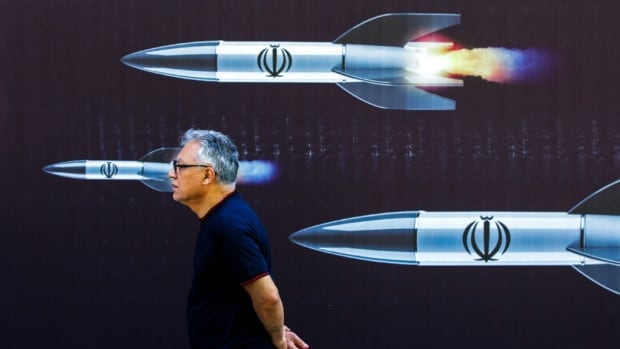As the sun rose over both Iran and Israel Friday morning, the details of what happened overnight near the Iranian city of Isfahan remained convoluted. But as the hours passed an initial sense of fear and apprehension gradually gave way to relief.
It appears — for the moment, anyway — that both adversaries are signalling they want to end a worrying spiral of strike and counter strike, and re-establish some guardrails in their intensely adversarial relationship that has threatened to engulf the Middle East in a wider regional war.
“If this is the extent of Israel’s retaliation it could be described as a de-escalatory strike,” said Andreas Kreig, a senior lecturer with the School of Security Studies at King’s College London.
The first reports about the incident in Isfahan came from Iranian state media, indicating there had been explosions and some kind of intrusion by enemy aircraft.
U.S. broadcasters quoted American officials who said Israeli missiles had hit an Iranian site. Then, hours later, Iranian state TV reported three small drones had been brought down.

Iran’s air defence system has been on high alert for weeks, but especially since Israel vowed to retaliate against Iran’s unprecedented drone and missile strike overnight on April 13, which saw hundreds of projectiles launched from Iran toward Israel.
It was the first time in the decades-long confrontation between the two countries that Iran had directly attacked Israel, and the scale of the missile barrage — which included more than 300 drones, rockets and ballistic missiles — surprised observers inside and outside the country.
It prompted Israel’s government to declare that some kind response was imperative.
Less than two weeks earlier, rockets fired from an Israeli aircraft had demolished an Iranian consular building in Damascus, Syria, killing 11 people, among them two of Iran’s most senior military commanders.
Israel’s war cabinet has convened several times since the Iranian attack, and while Israeli media reported a decision for some kind of response had been made, the actual attack had been delayed on more than one occasion.
Many in Israel believed the situation would remain quiet but tense until after the Jewish Passover holiday next week, so the Isfahan strikes overnight Thursday — assuming they were indeed launched by Israel — came as somewhat of a surprise.
Another unusual aspect of the Isfahan incident is the nature of the attack, which reports indicate came from much smaller drones than what could have conceivably been launched from Israel.
Of the roughly 300 drones and missiles launched by Iran on April 13, 99 per cent were intercepted and shot down, according to the Israeli military. Andrew Chang breaks down how Israel’s multilayered air defence system works and how it relies on its allies.
That may have been a means for Israel to follow through with its threat of retaliation without triggering escalation, said Krieg.
“The use of small drones, such as quadcopters provides a degree of implausible deniability that could help Iran downplay the effect of the attack,” he said in an email with CBC News.
“So, we could say that this attack makes a return to the shadow war that has been ongoing for years, if that is the extent of it. Iran’s messaging certainly suggests they do not have to respond to this attack.”
If true, that will come as a relief to many in Israel, Iran and far beyond.
But not to all.
Itamar Ben-Gvir, the far-right leader of an ultra-nationalist Israeli party and cabinet member tweeted out his one-word response on X Friday morning, writing a one-word post translated as “lame” or “feeble.”
Ben-Gvir had been urging a “crushing” response to Iran, whereas other members of Prime Minister Benjamin Netanyahu’s war cabinet had advised proceeding more cautiously while stressing alliance building and restraint.
‘Risk averse’
Netanyahu himself had said little about Iran’s missile strikes against his country nor how he intended to respond to them.
“Netanyahu is extremely risk averse, particularly if he knows that this could escalate and threaten him politically,” said Alon Pinkas, a former Israeli diplomat and foreign policy advisor.
Netanyhu, who’s facing corruption charges, has courted a precarious relationship with Israel’s far right parties to keep his government in power.
Many Israelis hold him personally responsible for Hamas’s attacks of Oct. 7, blaming him for letting down the country’s guard and doing deals with Hamas for much of his long term as Israel’s leader.
Pinkas says Netanyahu faced more political danger if he again was blamed for engaging and escalating another conflict with Iran.
“So this ping pong of attacks — Iran attacks Israel, Israel attacks Iran — in no way does this improve his political [position],” Pinkas told CBC News in an interview.
The initial response to Thursday night’s incident from other countries in the region was cautious and careful.
Egypt’s foreign ministry warned about the consequences of expanding the Iran-Israel conflict and said it was deeply concerned about the escalation of hostilities.
The head of the European Commission, Ursula von der Leyen, took a similar tone.
“It is absolutely necessary that the region remains stable and that all sides restrain from further action,” she said.
No mention from Israel
Israel’s government had yet to officially comment on the Isfahan incident — and may not.
Israel is previously believed to have launched cyber attacks against Iran, attacked nuclear facilities and assassinated important leaders in its nuclear program — but has never acknowledged its role.

And while this incident may represent a climb-down by both sides from the current crisis, the respite may be temporary.
“Israel and Iran are locked into this competitive struggle,” said Aaron David Miller, a long-time Middle East watcher with the Carnegie Endowment for International Peace.
In the aftermath of the overnight incident he told CNN: “There’s no solution to the problem of Iranian proxies, there’s no solution to the fact Iran is a nuclear weapons threshold state. And this relationship is going to be hanging over the international community like some sort of sword of Damocles.”








